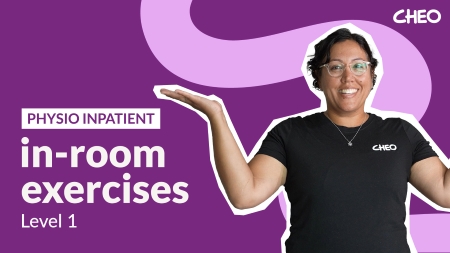Physiotherapists at CHEO have created a bilingual video series as part of an education campaign that encourages children and youth to move while receiving chemotherapy to avoid long-term complications.
This groundbreaking eight-part video series — available in both English and French on YouTube — is the first of its kind tailored for children aged two to 18. It positions CHEO as a global leader in physiotherapy education, empowering families with expert, accessible guidance every step of the way.
In each video, inpatient physiotherapists Kalinda Ramsaran and Arielle Roy explain and demonstrate simple movements with children of various ages and abilities.
 During cancer treatment, the physiotherapist helps treat side effects of disease, injuries or treatment through movement, special exercises, and manual therapy. As part of a child or youth’s health-care team, a physiotherapist can help them regain strength, movement, or flexibility, manage pain, and improve overall fitness.
During cancer treatment, the physiotherapist helps treat side effects of disease, injuries or treatment through movement, special exercises, and manual therapy. As part of a child or youth’s health-care team, a physiotherapist can help them regain strength, movement, or flexibility, manage pain, and improve overall fitness.
As part of any treatment plan, physiotherapists consider the conditions, such as the type of cancer; how treatments affect the body; the current strength, flexibility, balance, endurance, and ability to do everyday activities; types and amount of exercise before cancer; likes and interests; and goals.
Early intervention helps ensure kids receive physiotherapy support while they might feel their weakest, which aims to avoid longer-term physical challenges.
“Even though you're sick and you're attached to these machines, you can still get out of bed. You can still do exercises,” said Ramsaran.
The team was motivated to run an education campaign because they had considerable experience helping kids who needed more intensive rehabilitation. Early physiotherapy is simpler and less costly while helping families avoid unnecessary hospital visits and further, potentially more invasive treatments.
“There are kids where it can happen within a couple weeks. They can develop this weakness and, had they known, we might have been able to address it earlier,” said Ramsaran.
“It's like when you start getting a sore throat, you can calm it down before it gets worse.”
Sometimes children go months or years before they experience physical symptoms, which is why physiotherapists have tried to meet with families about six weeks after a cancer diagnosis to provide support and encourage movement.
This project was supported by a historic investment by the Ontario government to CHEO, which boosted staffing to allow physiotherapists to create videos and posters and build an education campaign.
The next step is to increase support for infants and their families, who are often scared to move their babies after they receive cancer diagnoses. Position changes and tummy time remain important during treatment, Roy and Ramsaran said.
CHEO hopes these videos help all CHEO families, as well as those across Canada and around the world.




